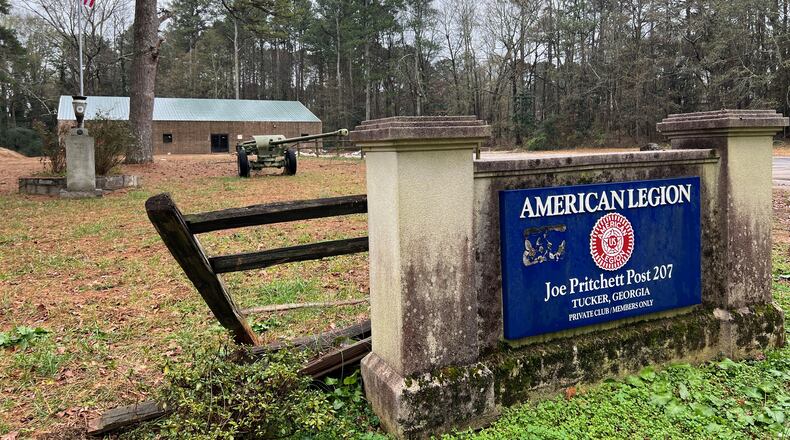Scott Brady believes Post 207 can be more than your average American Legion.
It could go beyond the stereotypical watering hole by offering mental health resources, an outdoor gym, a community garden. It could focus on outreach, and create more appeal for a younger crowd of veterans.
“There just feels like so much opportunity to reinvigorate the mission here,” said Brady, a Marine vet of the Desert Storm era.
But before any of that can happen, Post 207 needs a miracle — and a whole lot of money.
The Tucker-area legion building, you see, burned down in 2019. It’s kinda sorta rebuilt, but just barely.
The fire — triggered by a faulty wire somewhere inside the facility off Pine Valley Road — was one thing. But the subsequent worldwide pandemic, the associated labor and supply shortages, and additional permitting and ordinance delays meant even the construction that’s been done took a very long time to complete.
The lengthy timeframe, Brady and post commander Anthony Mathis say, then led their insurer to deny part of their claims: some $120,000 worth.
All told, the post owes its contractor about $200,000 for work that’s already been done.
To get the building fully operational? A total of $500,000.
To fulfill the bigger dream of making it “a thriving center for the community”? More like $750,000.
Credit: Tyler Estep
Credit: Tyler Estep
Brady was active at an American Legion post in Avondale Estates before recently moving to Tucker. He quickly found out there was no functional post in the area and started digging around to figure out why.
He eventually came upon the story of the fire and found contact information for the post commander.
Mathis, a fellow Marine, had shared many of the same dreams about what the future of Post 207 could be. But when Brady reached out a little less than two months ago, he was nearing the end of his rope and the limits of his hope.
Selling the property, paying off the contractor and moving on was a real consideration.
“[Brady] called me at my nine-to-five, out of the blue,” Mathis said with a chuckle. “I’m like, ‘Who the heck are you?’”
“But by the time we hung up the phone, I was like let’s do this. Let’s change the world.”
No one, as Brady put it, has ever accused Marines of being smart. They knew what they were getting into, and that it was going to take a bit of begging and lot of luck.
But they decided to fight on.
They asked the builder — Jeff Dell, “a great person” — to give them through January to come up with the money he was owed. If they didn’t have it by then, they’d sell off and ship out.
But in the meantime, they’d embark upon their rescue mission, asking anyone and everyone they could think of for money (and reaching out to the media for a little extra publicity). They’d touch base with business owners and their own members, which number somewhere north of 50 in the current post-fire, post-COVID era.
So far, things are actually going pretty well.
They’ve gotten one $50,000 donation, Mathis said, and a few Legionnaires have stepped up with sizable contributions of their own.
“We’re gonna get this,” Mathis said. “And I know with the community out there that supports us we’re gonna get there sooner rather than later.”
It’s important that they do. Because, as Mathis and Brady see it, reviving and modernizing this American Legion post isn’t a vanity project.
Attracting and serving a younger generation of veterans is crucial to survival.
For the institution, sure. But perhaps for the veterans themselves as well.
According to a recent report published by the Department of Veterans Affairs, more than 6,100 veterans committed suicide in 2020. Promoting good health and lifestyle choices, connecting veterans with job training, mentorship opportunities and other services can make all the difference.
“There’s a parallel here between saving this post and saving veterans,” Brady said. “... Beyond the barbecues, beyond the bingo, what else can bring them from isolation to engagement?”
Donations can be made via PayPal to savelegion207@gmail.com. Checks can be sent to American Legion Post 207, PO Box 524, Tucker, Ga. 30085.
Naming rights and other sponsorship opportunities are available.
Credit: HANDOUT
Credit: HANDOUT
About the Author
Keep Reading
The Latest
Featured




